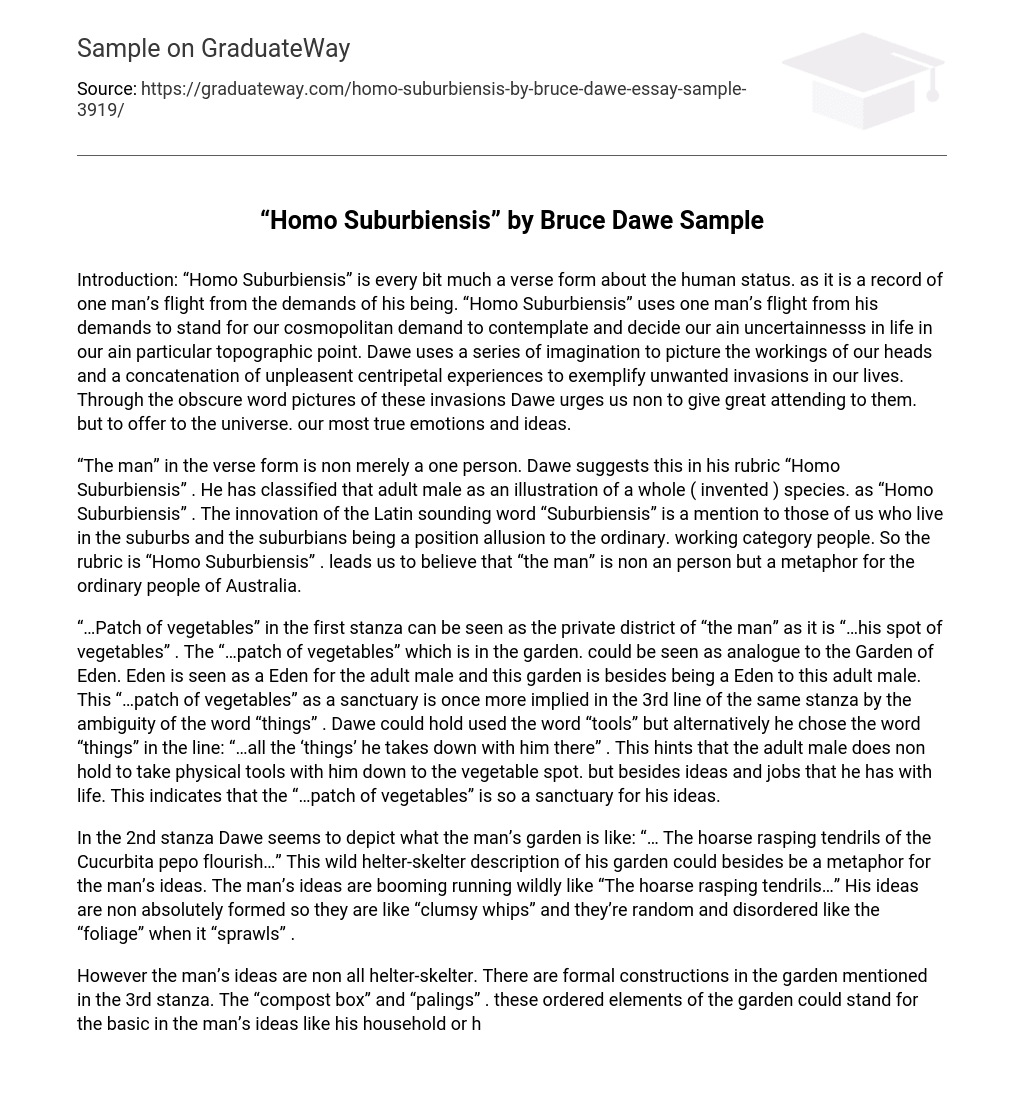Introduction: “Homo Suburbiensis” is every bit much a verse form about the human status. as it is a record of one man’s flight from the demands of his being. “Homo Suburbiensis” uses one man’s flight from his demands to stand for our cosmopolitan demand to contemplate and decide our ain uncertainnesss in life in our ain particular topographic point. Dawe uses a series of imagination to picture the workings of our heads and a concatenation of unpleasent centripetal experiences to exemplify unwanted invasions in our lives. Through the obscure word pictures of these invasions Dawe urges us non to give great attending to them. but to offer to the universe. our most true emotions and ideas.
“The man” in the verse form is non merely a one person. Dawe suggests this in his rubric “Homo Suburbiensis” . He has classified that adult male as an illustration of a whole ( invented ) species. as “Homo Suburbiensis” . The innovation of the Latin sounding word “Suburbiensis” is a mention to those of us who live in the suburbs and the suburbians being a position allusion to the ordinary. working category people. So the rubric is “Homo Suburbiensis” . leads us to believe that “the man” is non an person but a metaphor for the ordinary people of Australia.
“…Patch of vegetables” in the first stanza can be seen as the private district of “the man” as it is “…his spot of vegetables” . The “…patch of vegetables” which is in the garden. could be seen as analogue to the Garden of Eden. Eden is seen as a Eden for the adult male and this garden is besides being a Eden to this adult male. This “…patch of vegetables” as a sanctuary is once more implied in the 3rd line of the same stanza by the ambiguity of the word “things” . Dawe could hold used the word “tools” but alternatively he chose the word “things” in the line: “…all the ‘things’ he takes down with him there” . This hints that the adult male does non hold to take physical tools with him down to the vegetable spot. but besides ideas and jobs that he has with life. This indicates that the “…patch of vegetables” is so a sanctuary for his ideas.
In the 2nd stanza Dawe seems to depict what the man’s garden is like: “… The hoarse rasping tendrils of the Cucurbita pepo flourish…” This wild helter-skelter description of his garden could besides be a metaphor for the man’s ideas. The man’s ideas are booming running wildly like “The hoarse rasping tendrils…” His ideas are non absolutely formed so they are like “clumsy whips” and they’re random and disordered like the “foliage” when it “sprawls” .
However the man’s ideas are non all helter-skelter. There are formal constructions in the garden mentioned in the 3rd stanza. The “compost box” and “palings” . these ordered elements of the garden could stand for the basic in the man’s ideas like his household or his work. Even though they are stable residents of the man’s head. these objects are covered with the boisterous leaf. This could mean the changeless unexpected chew overing the adult male has about his household or any basic in his life.
Invasions like “… hearing a dog…”interrupt the man’s ideas this signifies the fiddling events in the man’s life. Through the distant nature at which Dawe portrays these events it suggests that we are non supposed to pay attending to the likes of these events. Like ” a far susurration of the traffic” which does non impact us. some things in the man’s life are non deserving paying attending or thought to.
These breaks are so boldly contrasted with the concluding stanza. a listing of what the adult male has offered to the universe. “Time. hurting. love. hatred. age. war. decease. laughter. febrility. ” this could be seen as a suggestion by Dawe that we ( represented by the adult male ) should offer all of ourselves to the universe. our most true whether it be love or detest. or even our hurting. The last word “fever” . is non seen as a disease or unwellness in this context. but a willingness to populate life. A manic privation to see and demo the universe all of our egos and our individualism. This simple word implies Dawe’s whole message that an ordinary adult male. can populate. experience and be in a “world of variables” and have a really fulfilled life.
Dawe’s verse form “Homo Suburbiensis” could be read at face value as descriptions of a adult male get awaying the demands of his life. But within the lines and the imagination. it incases a whole worth of significance and of Dawe’s position on the human status. Objects are no longer merely objects but a metaphor for our emotions and our actions. Dawe has included his sentiment. his doctrine and his manner of life into this one verse form. a simple describing of a man’s flight to his garden.





